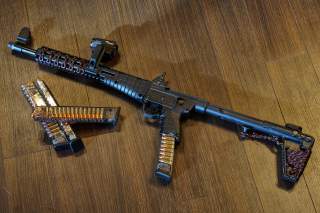Kel-Tec’s Sub 2000 'Folding Gun': Just How Good Is It?
A niche firearm for sure. Just how practical is it in the real world?
Kel-Tec’s Sub 2000 is one of the only “folding” firearms on the U.S. market today. Designed to be a compact pistol-caliber carbine with a long barrel, the Sub 2000’s main selling point is that it folds in half for transit and storage, allowing it to easily fit into a backpack or similar storage case. But as other pistol caliber carbines get smaller and smaller, is the Sub2000 still relevant?
When the Sub 2000 was originally introduced in 2001, pistol caliber carbines (PCCs) were still an incredibly niche category of the American firearms consumer market. There were some reproductions of old open bolt submachine guns converted to closed bolt and restricted to semi-automatic mode, some modern submachine guns restricted to semi-auto mode. There were very few modern semi automatics, and even fewer still that shared mags with pistols, which the Sub 2000 did.
At the time, it was a very attractive option for those looking to get a cheap carbine that shot pistol ammo for plinking or for hunting small game. The shared mags with pistols and the various models and calibers the Sub 2000 meant that almost anyone with a common pistol could get a Sub 2000 model that also used the same magazines. The presence of long stick mags like the 33 round Glock “big stick” also meant that the Sub 2000 could compete with SMG-based PCCs in magazine capacity.
But around the turn of the decade, PCCs saw a slight renaissance in the industry. The CZ Scorpion EVO 3 and SIG MPX, along with a variety of AR-15 variants that took pistol or Colt 9mm SMG mags rekindled interest in PCCs. The addition of the PCC Division into the USPSA and IDPA competitive shooting circuits also garnered a ton of interest in this category of guns.
These new PCCs featured AR-style controls and layouts, their own special variety of mags, and shorter barrels. The non-AR-based designs often featured side-folding or collapsible stocks/braces as well, bringing them to the same level of compactness or making them smaller than the Sub 2000.
But the Sub 2000 retains the advantage of barrel length over this new generation of PCCs, as most of them have between 4 to 8-inch barrels while the Sub 2000 has a full 16-inch barrel. Unfortunately, this doesn’t matter much in a 9mm carbine. While around 200 fps of muzzle velocity is gained by the extra length over an 8-inch barrel, the 9mm round will still drop and be affected by range significantly due to the relatively rounded and “fat” nature, compared to spitzer rifle bullets.
But the other aspects of the Sub 2000 fell behind. The original Sub 2000 lacked any provision to mount accessories. Kel-Tec remedied this in their second-generation of the gun, which features an M-LOK rail and Picatinny upper handguard. But optics still are not readily mountable on the Sub 2000 due to the folding nature of the gun. Any optics placed on the upper handguard prevent the rifle from folding, eliminating the one unique aspect of its design.
The shooting characteristics, while not bad, also fell behind the latest generation of PCCs. The Sub 2000 is a simple blowback firearm, where a heavy bolt moves back and forth under the recoil of a cartridge, with no locking mechanism. This can result in substantial felt recoil, notably the Colt 9mm SMG, another 9mm simple blowback firearm is said to have similar recoil to the full-size M16, despite the M16 cartridge being far more powerful.
Modern PCCs take some steps to mitigate this. Some designs, like semi-auto versions of the MP5, CMMG’s Banshee, or Sig Sauer’s MPX use various delayed blowback or locking systems to lighten the weight of the bolt and decrease its velocity. Other designs like PSA’s AK-V, Grand Power’s Stribog, or B&T’s various PCCs use a weighted or hydraulic buffer to slow the rearward motion of the bolt down.
The Sub 2000 doesn’t use any of these systems, and thus features a worse recoil impulse than many other modern PCCs. While it may still be the best gun for the job if you need a 16-inch barrel and also a compact form factor, other new PCCs are as compact or more so and feature better ergonomics and shootability.
Charlie Gao studied political and computer science at Grinnell College and is a frequent commentator on defense and national-security issues.
Image: Creative Commons.

